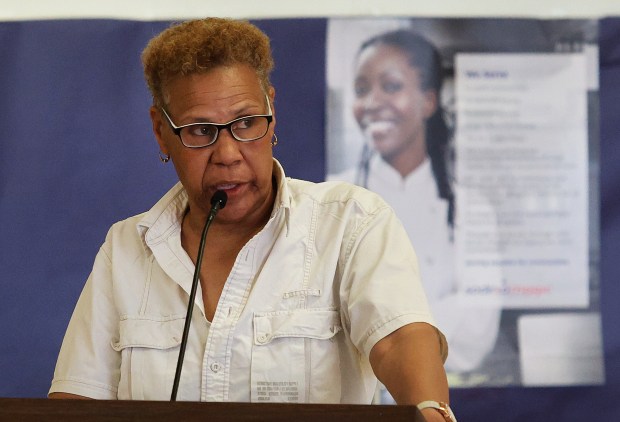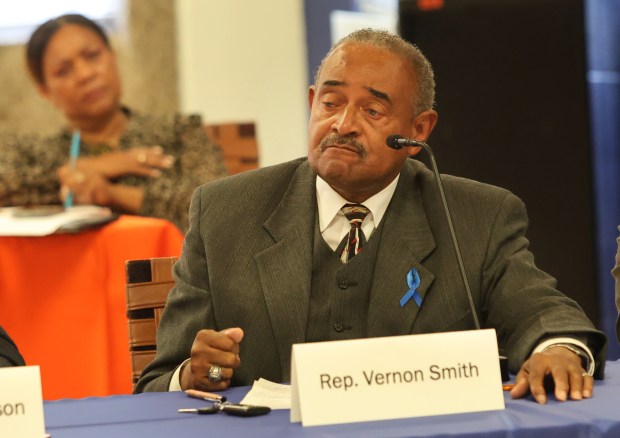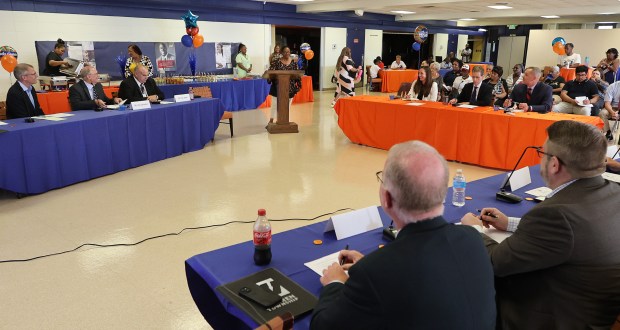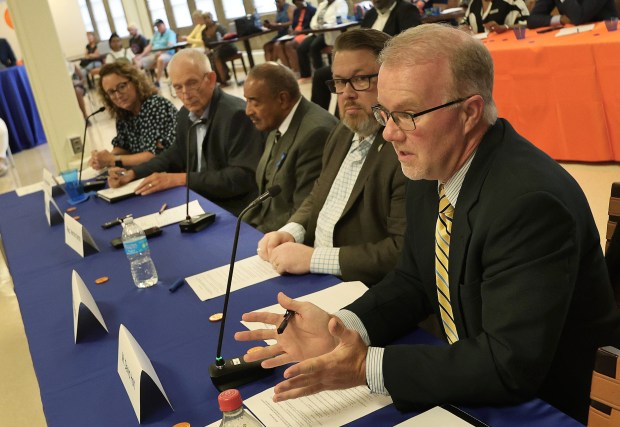Balloons saying “Welcome Home,” greeted residents inside the Gary Area Career Center during the state Distressed Unit Appeal Board’s Monday meeting where its members voted unanimously to terminate the school district’s distressed status, ending seven years of state control.
On July 1, Gary’s newly appointed school board and new Superintendent Yvonne Stokes will gain governing authority over the majority African-American district of about 4,100 students.
“This is just the beginning, today is a new chapter,” said Mayor Eddie Melton. “This process has torn this community apart, but I see an opportunity for us to pull together,” Melton said, voicing support for Stokes and the school board.
Monday’s vote capped a tumultuous seven-year period where the community saw its elected school board and superintendent cede authority to a state-hired Florida-based company, hired to slash its way to solvency for the district.
An emergency manager took over all the district’s decision-making, despite complaints from residents who compared it to living on a plantation.
Eric Parish, executive vice president of MGT Consulting, summarized the time period that saw MGT begin operating the district less than a month before school started in 2017 with orders to eliminate a $22 million operating deficit and more than $100 million in accumulated debt.

He said students, families, staff, the city, the state and MGT crossed paths “in an uncertain and chaotic situation.”
Some of the confusion in the community led more students to leave as the district faced the unknown.
Parish said MGT and Gary shared common goals of making the district financially sustainable, exiting distressed status and transitioning back to local control.

Parish acknowledged the pushback and antipathy from the community.
“This milestone achievement has required hard decisions, and hard decisions are not popular,” said Parish. “In our role as Manager, MGT was not here to be popular. We were here to do the work in making the difficult decisions,” Parish said.
Perhaps the toughest decision was the closing of the Wirt-Emerson School of Visual and Performing Arts in 2018 by the district’s first emergency manager, Peggy Hinckley. She also shuttered the administration office at 1988 Polk St. and centralized operations at the West Side Leadership Academy.

Parish credited MGT with eliminating Gary’s $22 million annual operating deficit, investing $50 million in school buildings and selling or demolishing most of its vacant schools.
He said enrollment has stabilized and voters approved a $72.2 million property tax referendum after two failed attempts by the district’s elected school board.
Perhaps the biggest carrot in the successful referendum was the promise that a “yes” vote would be required to leave state control.

Parish said teachers also received their first pay raise in 10 years and received multiple stipends and compensation increases.
State Rep. Vernon Smith, D-Gary, a non-voting member of the DUAB, offered a counterpoint to Parish’s comments.
Smith said when a Northwest Indiana delegation sought support from the state for the school district in 2016, lawmakers mostly blamed school officials for mismanagement.
Smith said the state deserved a share of blame.
He said state policies contributed heavily to Gary’s financial decline by allowing a disproportionate number of charter schools to open, in addition to passing legislation giving tuition money in the form of vouchers for private schools that drained the district’s funds.
He said state-imposed tax caps limiting funding also played a role in Gary’s downfall.
Paul Joyce, the state examiner and director of the State Board of Accounts, served on the DUAB for the entirety of the takeover.
He said in 2017, the district had no viable future.
“We looked and Gary wasn’t going to make it. We can hate MGT, we can hate me, I don’t care,” said Joyce. “We can hate what we don’t know. But what we do know is we have to have money to move forward… money is necessary.”
Audience members, including frequent critics, had a chance to speak, too.
Michaela Spangenberg, of the Gary Education Coalition, said she hopes the past seven years will serve as an example for other schools going into financial distress.
“We remain focused on the future of our children and an education that is robust,” she said.
“Thank God for today, it’s been a fight,” said Natalie Ammons. “It’s been a journey.”
Carole Carlson is a freelance reporter for the Post-Tribune.





